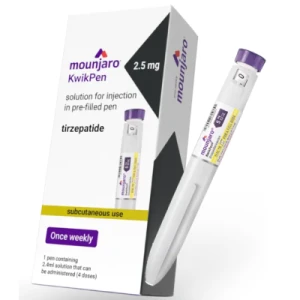Microdosing Mounjaro: Is it Safe?
Mounjaro is an effective weight loss injection that follows a recommended dosage schedule, specifically designed to mitigate the impact of side effects. The medication is administered once per week via an easy-to-use pen, with each dose containing 0.6ml of tirzepatide.
If you’re researching Mounjaro for weight loss, you may have come across a term called microdosing. It’s an unconventional way of taking the treatment that goes against the recommended dosage schedule. But what exactly is it all about?
This article will delve into microdosing Mounjaro, outlining what the practice is, why people might be tempted to do it, and ultimately whether it’s safe and recommended. Let’s begin.
START YOUR MOUNJARO CONSULTATION TODAY
What is Mounjaro Microdosing?
Microdosing Mounjaro involves taking smaller-than-recommended doses of your weight loss medication. This is a growing trend among people hoping to maintain their weight loss long-term after reaching their target. Others may try microdosing, hoping to make their medication last longer and, therefore, reduce the cost of treatment.
Mounjaro microdosing may also help mitigate gastrointestinal side effects, which are more common with higher doses. Emerging research also suggests potential benefits for women’s health, and some users claim that microdosing helps them to manage symptoms of perimenopause and endometriosis.
People try Mounjaro microdosing for a multitude of reasons, but is the practice safe?
Should You Microdose Mounjaro?
Microdosing is not a clinically approved method of using Mounjaro and is not recommended by healthcare professionals. UK guidelines currently specify that weight loss injections are only licensed for certain medical conditions, including diabetes, obesity, and other weight-related illnesses. In these cases, users administer Mounjaro according to a medically authorised dosing schedule.
What is the Recommended Mounjaro Dose?
Doctors recommend people use Mounjaro according to a clinically endorsed dosing regimen. The lowest approved dose, also called the initiation dose, is 2.5 mg per week for four weeks. The Mounjaro dose gradually increases over the following weeks and months according to the following schedule:
- Weeks 1-4: 2.5 mg per week
- Weeks 5-8: 5 mg per week
- Weeks 9-12: 7.5 mg per week
- Weeks 13-16: 10 mg per week
- Weeks 17-20: 12.5 mg per week
- Week 21 onwards: 15 mg per week

The Medicines and Healthcare Products Regulatory Agency (MHRA) has not assessed the safety or efficacy of Mounjaro in people who do not meet these requirements. Therefore, microdosing may not be a safe way to use Mounjaro or any other weight loss injection.
Have Any Clinical Trials Been Carried Out Regarding Microdosing Mounjaro?
Mounjaro microdosing has not yet been the subject of any clinical trials, though there is emerging interest in the practice. The American Diabetes Association published a study theorising how microdosing GLP-1 agonists like Wegovy and Mounjaro may be a viable alternative when the standard dosing isn’t ideal. The report focused on semaglutide, the active ingredient in Wegovy.
The possible benefits of microdosing weight loss injections outlined in this paper include:
- Navigating supply issues
- Reducing treatment costs
- Mitigating side effects
- Allowing for greater flexibility of treatment plans, where dose adjustments have a lower impact on the user
The authors suggest several potential applications of microdosing GLP-1 agonists. For example, it may help people transition between different types of weight loss injections more easily. Microdosing may also help people adjust to necessary dosing changes by allowing them to taper their dose in smaller increments.
This paper also suggests that microdosing may reduce the impact of gastrointestinal symptoms. These frequently flare up during dose increases and are generally more severe at higher doses. Smaller incremental dose adjustments may reduce symptom intensity and could be particularly beneficial for people who experience severe side effects with Mounjaro. Finally, microdosing can make treatment more cost-effective by extending the use of each pen.
Despite the theorised advantages of microdosing, this practice will not be safe until clinically tested and approved. Current methods of microdosing Mounjaro expose users to several unnecessary risks, and the prospective benefits have not yet been confirmed by medical research.
Mounjaro
- Approved Weight Loss Treatment
- Suitable for adults with a BMI of +30kg/m²
- Pre-filled injection pen
What Are the Risks Involved in Microdosing on Mounjaro?
Microdosing Mounjaro is not a clinically approved treatment and, as such, carries significant risks. There are no clinical studies into the safety of altering your treatment regimen, and no standardised guidelines for doing so. This means people using the microdose method must do so without medical supervision or support.
Several things can go wrong when you microdose Mounjaro. Mounjaro pens are not designed for microdosing, which makes it difficult to accurately administer a lower dose. This translates to a substantial risk of underdosing or accidental overdosing.
Furthermore, tampering with Mounjaro pens to manipulate the dosage can increase the risk of contamination and infection. Microdosing also extends the Mounjaro pen's lifespan beyond 30 days, and doctors don’t recommend using the medication after this period. Therefore, microdosing carries a risk of exposure to expired medicine.
Reasons for Microdosing Mounjaro
Despite not being endorsed by doctors, Mounjaro microdosing is gaining popularity among people using weight loss injections. Some of the most common reasons for this are to reduce treatment costs, ease side effects, maintain weight loss, and manage menopause symptoms.
Microdosing Mounjaro Because of Price
Cost reduction is a popular reason for microdosing Mounjaro. Taking lower-than-recommended doses allows people to make each Mounjaro pen last longer, therefore reducing the price they pay for treatment.
If the increased cost of Mounjaro is a concern, there are other weight loss injections to consider. For example, Wegovy is available at a lower price point than Mounjaro. Wegovy contains semaglutide as its active ingredient, which can promote weight reduction of up to 15% after one year of treatment. If you would like to switch from one type of weight loss injection to another, speak to a licensed clinician first.

For a comprehensive comparison of Mounjaro and Wegovy, including effectiveness, pricing, and dosing schedules, check out our dedicated article.
Mounjaro Microdosing for Side Effects
Mounjaro frequently causes gastrointestinal side effects like nausea, vomiting, and diarrhoea. These symptoms are dose-dependent, and some people are more susceptible than others. People who experience severe side effects may use microdosing to reduce their symptoms, which are often milder at lower doses.
For many people, the side effects of Mounjaro are mild to moderate and dissipate as their body adapts to the medication. They may manage their symptoms with small lifestyle modifications, such as adjusting their eating habits. Those with severe or persistent symptoms, however, should contact a healthcare professional to rule out more serious medical problems.
Microdosing Mounjaro for Maintenance
Many people stop taking Mounjaro when they reach their goal weight, but regain is common when appetite returns. Proponents of microdosing find that a small dose reduces their hunger just enough to withstand cravings. This allows them to maintain their lower weight without losing more.

Long-term weight maintenance is possible without microdosing Mounjaro. However, the high rate of weight regain seen among people discontinuing treatment suggests the need for a considered approach. Guidelines from NICE recommend that healthcare teams offer support to users for at least a year after treatment. This may include practical advice on lifestyle adjustments or making changes at work and home to avoid slip-ups. If you plan to stop using Mounjaro, consult a licensed clinician for advice on how to proceed.
Microdosing Mounjaro for Menopause
There is limited research into the benefits of Mounjaro for menopause, but ongoing studies aim to determine its efficacy for alleviating symptoms, like hot flashes. People may also microdose Mounjaro in an attempt to lose weight gained during menopause.
If you are concerned about menopause symptoms or weight gain, contact a licensed clinician for advice. Their recommended course of action will depend on your personal needs, but they may suggest standard dosing with Mounjaro or another weight loss medication, hormone replacement therapy (HRT), or lifestyle interventions (like a healthy diet, regular exercise, and cognitive behavioural therapy).
Mounjaro
- Approved Weight Loss Treatment
- Suitable for adults with a BMI of +30kg/m²
- Pre-filled injection pen
Reliable Weight Loss Support from Prescription Doctor
Losing weight with Mounjaro is a journey that requires commitment and meaningful lifestyle changes. While this may seem like a daunting process at first, the good news is that you don’t need to go through it alone.
Prescription Doctor has been helping individuals reach their weight loss goals since 2013, and we’re ready to do the same for you. We’ve made it our mission to take the hassle out of healthcare and to offer specialist guidance whenever needed.
Our experienced clinicians will help you determine whether Mounjaro is suitable for your circumstances, and regularly check in with you to monitor progress. We tailor our service to meet your needs.
In addition to information about microdosing Mounjaro, you can find a library of resources on the treatment, including the best time to take it, how it affects pregnancy, reasons for weight loss plateaus, and a guide to the common sulphur burp side effect. We even discuss what happens when you stop taking the medication.
Ready to begin? Start your Mounjaro consultation with us today.
Sources
- The Guardian (2025): Microdosing: how ‘off-label’ use of weight loss jabs is spreading from US to UK.
- MHRA (2025): GLP-1 medicines for weight loss and diabetes: what you need to know.
- Diabetes Care (2025): One Size Does Not Fit All: Understanding Microdosing Semaglutide for Diabetes in Multidose Pens.
- Endocrine Society (2023): Adverse Events Related to Tirzepatide.
- EMC (2025): Mounjaro KwikPen 2.5mg solution for injection in pre-filled pen.
- Department of Health and Social Care (2023): Accessing Wegovy for weight loss: Everything you need to know.
- Journal of Clinical Medicine (2022): Clinical Recommendations to Manage Gastrointestinal Adverse Events in Patients Treated with GLP-1 Receptor Agonists: A Multidisciplinary Expert Consensus.
- BioMed Central (2025): Trajectory of the body weight after drug discontinuation in the treatment of anti-obesity medications.
- National Institute for Health and Care Excellence (2025): People need support to keep weight off after treatment ends.
- Mayo Clinic: Tirzepatide on Menopausal Vasomotor Symptoms and Biological Ageing in Post-menopausal Women with Obesity.
- Mayo Clinic (2023): The reality of menopause weight gain.
- EMC: Information for the Patient.
Authored By

Kate Latham
Medical Content WriterPublished on: 21/11/2025
Reviewed By

Mohamed Imran Lakhi
MPharm - Lead PharmacistReviewed on: 21/11/2025
© 2013 - 2026 Al Muhsineen Limited. All Rights Reserved. Registered Pharmacy: 34 Halliwell Road, Bolton BL1 8RL. Registered Office: 254 First Floor, Shearbrow, Blackburn, England, BB1 8DS






